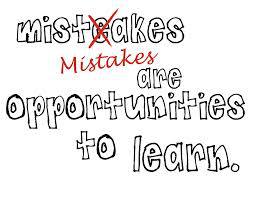Blog
Learning From Mistakes
Children constantly compare themselves to their peers and siblings. No matter how much teachers may discourage the “Whadyagets” and parents may intone, “You and your sister are different people. You’re each good at different things,” kids are going to judge themselves based on their impression of how they stack up compared to those around them in school and at home. If a child repeatedly gives the wrong answer when called upon class or doesn’t move through the levels of a video game as quickly as her sister does (due to not being able to overcome the various obstacles that reappear each time she plays), she can often come to the erroneous conclusion that she isn’t as smart as her classmates and siblings. But the truth is that it may just be that her brain needs a little extra training in a certain aspect of her executive function skills.
 In an article on Wired.com, Jonah Lehrer delves into why people learn (specifically from their mistakes) at different rates, which is one of the main areas kids are likely to judge themselves on with particular harshness. Lehrer cites a seminal study out of Michigan State University that focuses on how the brain neurologically responds to errors and how this response can then go on to affect immediate learning. Dr. Jason Moser found that there were two quantifiable, brain-based responses to making an error: error-related negativity(ERN), which occurs approximately 50 milliseconds after a mistake is made and error positivity (Pe), which occurs somewhere between the 100 and 500 millisecond mark after an error. ERN is a mostly involuntary response that, according to Lehrer “helps monitor behavior, anticipate rewards, and regulate attention.” Since these are all aspects of executive function, it stands to reason that children whose executive function skills need improving will potentially have a lesser or slower ERN response and may even barely note their mistake. On the other hand, Pe is associated with a more pointed awareness of the mistake itself and the resultant bad feeling it engenders. Again, executive function is at play here, and those students who have an inconsistent or weak Pe signal may not get enough appropriately negative feedback to actually learn from their mistakes.
In an article on Wired.com, Jonah Lehrer delves into why people learn (specifically from their mistakes) at different rates, which is one of the main areas kids are likely to judge themselves on with particular harshness. Lehrer cites a seminal study out of Michigan State University that focuses on how the brain neurologically responds to errors and how this response can then go on to affect immediate learning. Dr. Jason Moser found that there were two quantifiable, brain-based responses to making an error: error-related negativity(ERN), which occurs approximately 50 milliseconds after a mistake is made and error positivity (Pe), which occurs somewhere between the 100 and 500 millisecond mark after an error. ERN is a mostly involuntary response that, according to Lehrer “helps monitor behavior, anticipate rewards, and regulate attention.” Since these are all aspects of executive function, it stands to reason that children whose executive function skills need improving will potentially have a lesser or slower ERN response and may even barely note their mistake. On the other hand, Pe is associated with a more pointed awareness of the mistake itself and the resultant bad feeling it engenders. Again, executive function is at play here, and those students who have an inconsistent or weak Pe signal may not get enough appropriately negative feedback to actually learn from their mistakes.
Lehrer ties this study to the work of Dr. Carol Dweck (see the previous blog entitled “The Right to be Wrong”) that focused on the benefits of a growth (versus fixed) mindset. Basically, subjects who had the preferred and more beneficial growth mindset were better able to learn from their mistakes and therefore showed much larger Pe signals. They were more aware of their mistakes and then were more able to learn from them and avoid future errors. It also stands to reason that those subjects with larger ERN signals would have a stronger motivation for avoiding errors in the first place, though the Lehrer piece does not explicitly state this finding.
So how can this rather technical information help a child with executive function issues who sees herself as not acquiring knowledge as rapidly or as well as the others in her classes? First of all, explain to her that even if she’s not learning quickly from her mistakes it does not mean she is dumb or slow or unmotivated to learn. Secondly, let her know that when she does recognize her mistakes, noting where she erred and then purposefully analyzing how she can avoid similar errors in the future in and of itself will help more rapidly recognize her mistakes in the future, even if they are of a different type. Finally, focused and regular practice of executive function skills can boost her specific brain performance and help strengthen her ERN and Pe signals in the process. Websites like Lumosity and Learning Works for Kids (Note: both sites are for-pay, but the former also has a convenient smart phone app available) have on them myriad games that allow children the opportunity to work on improving their overall executive function skills. When she plays these games, you can help your child specifically focus on noticing her own errors and analyzing how to both correct and avoid them in the future. As she becomes more adept at this and her brain functions improve, so too will the speed with which she recognizes her errors and is able to utilize this information effectively.
So the next time your child tells you she feels like she keeps making the same mistakes over and over and isn’t learning as fast as those around her, arm her with some information and help her strengthen her brain’s signals with some fun games and focused learning.

